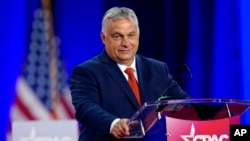Hungarian Prime Minister Viktor Orban received a warm reception Thursday in Texas, where he was a featured speaker at the Conservative Political Action Conference, a major event on the calendar of the right wing of the Republican Party.
In remarks that ran for approximately 30 minutes, Orban demonstrated why he has become popular among American conservatives, rattling off a litany of claims and accomplishments that dovetailed with many American conservative voters' priorities.
Orban touted his country's low crime rate, its success at preventing immigrants from crossing its borders, its crackdown on the political left, its restrictions on the rights of gay and transgender individuals, and its low taxes.
He cast liberals and progressives as history's great villains and urged audience members to fight to place "Christian values" at the center of their politics.
"The horrors of Nazism and communism happened because some Western states in continental Europe abandoned their Christian values," Orban said. "And today's progressives are planning to do the same. They want to give up on Western values and create a new world — a post-Western world. Who is going to stop them if you don't?"
Seen as strongman
Orban, 59, began his career as a radical liberal, but over the years he steered the political party Fidesz, which he had helped found, in a more populist and conservative direction. He remains president of the party.
When he became prime minister for the second time in 2010 (he had held the office from 1998 to 2002), Orban moved quickly to consolidate both political and cultural power in Hungary, facilitated by Fidesz's two-thirds majority in parliament, which allowed it to draft a new constitution.
The revised constitution, which went into effect in 2012, wrote Hungarian nationalism and Christianity into the country's laws and helped cement Fidesz's political dominance. A new electoral system was put in place that allowed the party to retain more than two-thirds of the body's seats in the 2014 elections despite earning 44.5% of the votes cast.
Transparency International has characterized Hungary's elections as "free but not fair." Citizens can cast votes, and the votes are accurately counted, but the structure of the system ensures that Fidesz consistently wins representation that far exceeds its share of the votes.
Judicial, press freedom curtailed
In addition to dominating parliament, Orban has restructured the Hungarian judiciary, reducing its independence and installing judges sympathetic to his administration.
At the same time, the government has passed laws limiting freedom of speech and cracking down on independent media. Allies of Orban, meanwhile, have created a pervasive conservative media ecosystem that dominates the airwaves and generally echoes the positions of the Orban government.
"Since returning to power in 2010, Orban has unceasingly attacked media pluralism and independence. After public broadcasting was turned into a propaganda organ, many private media were taken over or silenced," according to the organization Reporters Without Borders. "The ruling party, Fidesz, has seized de facto control of 80% of the country's media through political-economic maneuvers and the purchase of news organizations by friendly oligarchs."
The prime minister's many critics argue he is an autocrat who has turned his country of 10 million people in the heart of Europe into a near-dictatorship. Orban has also been widely criticized for appointing friends and relatives to positions of authority and for turning a blind eye to corruption among senior leaders.
U.S. President Joe Biden, when campaigning for the presidency, characterized Orban as a "totalitarian" and a "thug."
Multiple controversies
Under Orban's leadership, Hungary has passed laws discriminating against LGBTQ people and has made preserving Hungary's culture — as Orban defines it — a key element of his mission as prime minister.
His defense of Hungarian culture has, according to his critics, frequently come close to explicit racism.
In a 2018 speech, for example, he said, "We must state that we do not want to be diverse and do not want to be mixed: We do not want our own color, traditions and national culture to be mixed with those of others. … We do not want to be a diverse country."
Just last week, in a speech delivered in Romania, Orban criticized other European countries for allowing the "mixing" of people of different races. Referring to Hungary, Orban said, "We are not a mixed race, and we do not want to become a mixed race."
Those remarks prompted widespread denunciations from other world leaders, particularly within the European Union. One of Orban's own senior advisers resigned, calling the speech "pure Nazi text."
Asked about Orban's comments, European Commission President Ursula von der Leyen noted, "All EU member states, including Hungary, signed up to common global values."
"Discriminating on the basis of race is to trample on those values," she said. "The European Union is built on equality, tolerance, justice and fair play."
American following
Over the past several years, Orban has amassed a considerable following among U.S. conservatives, chief among them former President Donald Trump. Comparing their governing styles, former Trump adviser Steve Bannon has described Orban as "Trump before Trump."
The former president has personally praised Orban on a number of occasions, and on Wednesday he posted pictures of himself with the prime minister, who visited Trump in Florida, on the social media site Truth Social.
"Great spending time with my friend, Viktor Orban, the Prime Minister of Hungary," Trump wrote. "We discussed many interesting topics — few people know as much about what is going on in the world today."
Major figures in American conservative media frequently praise Orban and his policies. Fox News host Tucker Carlson has produced a documentary on Hungary under Orban, met with the leader in Budapest, and even filmed his nightly television show there for a week last year.
'A lot to learn from Orban'
Rod Dreher, an editor at The American Conservative magazine, characterizes himself as an Orban "booster." Writing from CPAC in advance of the Hungarian leader's speech Thursday, he said, "American conservatives have a lot to learn from Orban."
He continued: "The United States is not Hungary, and some of what works there would not work here. Nevertheless, I appreciate Orban's aggressive conservatism, especially his social conservatism, when compared with the all-hat-no-cattle version we tend to get from American conservatives. And, I appreciate how Orban instinctively knows that we are in a struggle for the future of Western civilization — and acts like it."
Florida Governor Ron DeSantis, who some point to as a possible Republican presidential candidate in 2024, is also an admirer of Orban, according to his press secretary.
Last year, DeSantis signed a bill into law that barred public school employees from discussing topics such as homosexuality and transgender identities. The restrictions were so broad that the legislation became known as the "Don't Say Gay" law.
At the time, DeSantis' press secretary suggested the effort was modeled on Orban's laws in Hungary, saying, "We were watching the Hungarians and were inspired by their legislation."








